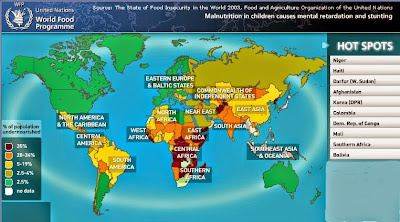FAO: Number of hungry people rises to 963 million (9 December 2008)
For people with compassion and a sense of responsibility the FAO warning that another '40 million people have been pushed into hunger this year 'came as a shock.
How could that happen given that our international leaders are so committed to universal values: In December 2008, the UN celebrated the 60th anniversary of the Declaration of Human Rights, and also a "UN Climate Change Conference" took place in Poland. Only in September 2008, world leaders discussed the Millennium Development Goals with the aim of reversing "the grinding poverty, hunger and disease affecting billions of people". Last year the World Food Programme (WFP) gave assistance to 86.1 million people in 80 countries. Yet the world hunger problem is exploding. Almost one billion people are now affected, even though the veg protein given to the beef herd alone would feed them all, and many more.
A grim scenario
Without a radical change of course, the future is looking dark: The FAO expects that the demand for feed will double by 2050 because of growing meat and dairy consumption,WWF warns that "two planets" would be required to sustain current lifestyles within a generation", and only very few countries do remain within their "biocapacity".
So there will be more suffering if we don't stop living beyond our means. Even a new kind of colonialism may develop when affluent countries satisfy their meat and biofuel needs by buying up and exploiting poor far-away regions, pushing local populations into poverty and starvation and polluting their soil, water and air.
Vegetarianism against eco-crunch
The problem of world hunger is not a natural disaster because, right now, Mother Earth is still able to provide for us all. A wisely managed agriculture must at least secure this status-quo. But that's not enough! Jazzed-up and questionable old FAO concepts (cloning, genetical engineering, more fertilizers etc) are obviously not suitable to overcome new challenges. We need a fresh outlook, based on affordability, sustainability and fairness. Environmental destruction by the meat industry must be addressed and stopped.
IPCC chief: "Don't eat meat!"
In a press conference in Paris last January, the Indian scientist Rajendra Pachauri highlighted "the importance of lifestyle changes". It's now high time for FAO's Dr. Diouf and his scientists to listen to their UN colleague and Nobel Prize-winner Pachauri!
Vegetarianism is a beneficial gate into a more humane future: It helps the hungry. It helps the environment. It helps us all.
animacija: http://www.wfp.org/country_brief/hunger_ma.../map_popup.html
Svetovna organizacija WFP (World Food Program) pravi ,daje v sloveniji podhranjenih 5% prebivalstva! No ja, tej stevili bi verjetno lahko oporekali!
In contrast, approximately 4.7 billion people live in low and middle-low income economies. This world, earning under $3,705 GNI per capita, is made up of about 99 low and middle-income countries in which people generally have a lower standard of living with access to fewer goods and services than people in high-income countries.
Facts and Figures on Hunger and Poverty
In 2005, almost 1.4 billion people lived below the international poverty line, earning less than $1.25 per day.
Every day, almost 16,000 children die from hunger-related causes - one child every five seconds.
In essence, hunger is the most extreme form of poverty, where individuals or families cannot afford to meet their most basic need for food.
iz >>


Ni komentarjev:
Objavite komentar